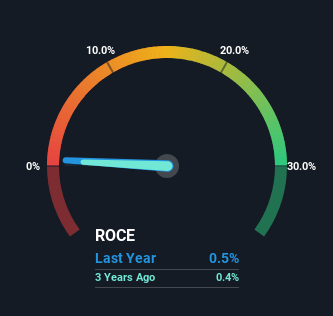Returns On Capital At Coca-Cola Bottlers Japan Holdings (TSE:2579) Paint A Concerning Picture

Ignoring the stock price of a company, what are the underlying trends that tell us a business is past the growth phase? When we see a declining return on capital employed (ROCE) in conjunction with a declining base of capital employed, that's often how a mature business shows signs of aging. Ultimately this means that the company is earning less per dollar invested and on top of that, it's shrinking its base of capital employed. In light of that, from a first glance at Coca-Cola Bottlers Japan Holdings (TSE:2579), we've spotted some signs that it could be struggling, so let's investigate.
What Is Return On Capital Employed (ROCE)?
If you haven't worked with ROCE before, it measures the 'return' (pre-tax profit) a company generates from capital employed in its business. To calculate this metric for Coca-Cola Bottlers Japan Holdings, this is the formula:
Return on Capital Employed = Earnings Before Interest and Tax (EBIT) ÷ (Total Assets - Current Liabilities)
0.0054 = JP¥3.5b ÷ (JP¥845b - JP¥197b) (Based on the trailing twelve months to December 2023).
Thus, Coca-Cola Bottlers Japan Holdings has an ROCE of 0.5%. Ultimately, that's a low return and it under-performs the Beverage industry average of 7.1%.
See our latest analysis for Coca-Cola Bottlers Japan Holdings

In the above chart we have measured Coca-Cola Bottlers Japan Holdings' prior ROCE against its prior performance, but the future is arguably more important. If you're interested, you can view the analysts predictions in our free analyst report for Coca-Cola Bottlers Japan Holdings .
So How Is Coca-Cola Bottlers Japan Holdings' ROCE Trending?
There is reason to be cautious about Coca-Cola Bottlers Japan Holdings, given the returns are trending downwards. To be more specific, the ROCE was 3.8% five years ago, but since then it has dropped noticeably. And on the capital employed front, the business is utilizing roughly the same amount of capital as it was back then. Companies that exhibit these attributes tend to not be shrinking, but they can be mature and facing pressure on their margins from competition. So because these trends aren't typically conducive to creating a multi-bagger, we wouldn't hold our breath on Coca-Cola Bottlers Japan Holdings becoming one if things continue as they have.
In Conclusion...
In summary, it's unfortunate that Coca-Cola Bottlers Japan Holdings is generating lower returns from the same amount of capital. It should come as no surprise then that the stock has fallen 12% over the last five years, so it looks like investors are recognizing these changes. Unless there is a shift to a more positive trajectory in these metrics, we would look elsewhere.
If you want to continue researching Coca-Cola Bottlers Japan Holdings, you might be interested to know about the 1 warning sign that our analysis has discovered.
While Coca-Cola Bottlers Japan Holdings isn't earning the highest return, check out this free list of companies that are earning high returns on equity with solid balance sheets.
If you're looking to trade Coca-Cola Bottlers Japan Holdings, open an account with the lowest-cost platform trusted by professionals, Interactive Brokers.
With clients in over 200 countries and territories, and access to 160 markets, IBKR lets you trade stocks, options, futures, forex, bonds and funds from a single integrated account.
Enjoy no hidden fees, no account minimums, and FX conversion rates as low as 0.03%, far better than what most brokers offer.
Sponsored ContentNew: AI Stock Screener & Alerts
Our new AI Stock Screener scans the market every day to uncover opportunities.
• Dividend Powerhouses (3%+ Yield)
• Undervalued Small Caps with Insider Buying
• High growth Tech and AI Companies
Or build your own from over 50 metrics.
Have feedback on this article? Concerned about the content? Get in touch with us directly. Alternatively, email editorial-team (at) simplywallst.com.
This article by Simply Wall St is general in nature. We provide commentary based on historical data and analyst forecasts only using an unbiased methodology and our articles are not intended to be financial advice. It does not constitute a recommendation to buy or sell any stock, and does not take account of your objectives, or your financial situation. We aim to bring you long-term focused analysis driven by fundamental data. Note that our analysis may not factor in the latest price-sensitive company announcements or qualitative material. Simply Wall St has no position in any stocks mentioned.
About TSE:2579
Coca-Cola Bottlers Japan Holdings
Engages in the purchase, bottling, packaging, distribution, marketing, and sale of carbonated, coffee, tea-based, mineral water, alcohol, and other soft drinks in Japan.
Flawless balance sheet with moderate growth potential.
Similar Companies
Market Insights
Community Narratives



